 Severna Park
Severna ParkOvercast, 53°
Wind: 9.2 mph, E
 Severna Park
Severna Park
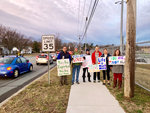
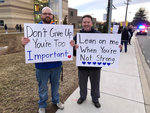
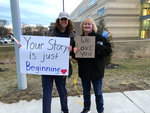
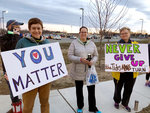
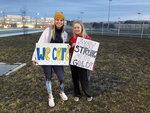

Suicide High. It’s a disturbing nickname, but it’s how some students and parents have heard Severna Park High School described by their friends or acquaintances who live elsewhere in Anne Arundel County.
It shouldn’t be surprising. Severna Park has seen nearly 20 suicides in as many years, and according to a study by the Anne Arundel County Department of Health, there were 76 suicide attempts by youth ages 10-24 in Severna Park between the years of 2012 and 2016, a sidebar over the 60 attempts between 2008 and 2012.
Now students and parents are coming together to say enough is enough — it’s time for Severna Park to face this problem.
“It’s a situation that nobody knows how to approach,” said SPHS junior Parker Cross. “But ignoring it is not a solution.”
An Expectation Of Perfection
The numbers paint Severna Park as a community that anyone would be proud of: a high school with a 95 percent graduation rate, with 11 state sports championships in the past five years alone, with Advanced Placement enrollment in the top 95 percentile, all in a zip code where the median family income is approximately $130,000.
But with those numbers comes the pressure on young people to excel, to outshine, to be perfect — and it is taking an emotional toll.
“These kids put a smile on their face every day and say they’re good, but not many of us are really sitting down and asking them how they’re doing,” said Maria Putzi, a parent of two SPHS students. “We as a community need to love on those kids for who they are.”
Nobody knows that need better than the students themselves. Cross explained the culture for young people in Severna Park is so overwhelming that feeling suicidal is the rule, not the exception. “I don’t know someone who hasn’t had to talk someone out of killing themselves,” she said. “How many people have to kill themselves for us to care?”
Cross joined her friend Katrina Schultz in organizing the recent presentation “Let’s Talk: Suicide Prevention and Awareness” at St. Martin’s-in-the-Field, where Cross shared insight into the pressures that Severna Park teenagers face: pressures related to their academics, to their extracurricular activities, to their home life, to their appearance and to maintaining an overall image of being the best. “Being a teenager in this area, those are the expectations,” she told the crowd in her speech. “Now whether they stem from the parents, the school or other peers, those are still part of the pressures teens face every day.”
Cross and Schultz agreed that they don’t know anyone at any grade level who is not taking at least one AP class. Some are taking more than four because they feel it is expected of them. Along with that, they know their peers and their parents alike are expecting them to make the sports team that season, get a part in Rock ‘N’ Roll Revival, maintain a part-time job, and/or still be social, all while keeping their GPA above a 4.0. Schultz and Cross are among the students who recognize the anxiety that these expectations can cause. “We don’t have to be No. 1 at everything,” Schultz said.
So, does this pressure come from the parents, the school system, or the students themselves? Regardless of where it starts, all parties agree they need to work to absolve it.
Anne Arundel County Public Schools does not require students to take any honors or AP courses, and it requires students to maintain only a C average (2.0 GPA) to participate in extracurricular activities. As Bob Mosier, public information officer for AACPS, emphasized, AP courses are not the right choice for every student. “No judgment should come from a course load — period,” he said. “That’s a mindset that begins in the home. We need parents to be partners in that.”
This sentiment is shared by Jennifer Corbin, director of Anne Arundel County’s Crisis Response System. The responsibility, she said, is on the schools and the parents together. “I truly believe it’s both,” she said. “I don’t know that you can pinpoint one or the other. The stress is coming from all aspects. We can’t fix it until we all step back and say, ‘We all have to work together.’”
Where Can A Kid Go For Help?
Severna Park teenagers face further stress because they don’t know where to turn when the pressure starts to get overwhelming.
Even when resources are available, teens might not know how to access them. Following a recent tragedy in the community, Principal Patrick Bathras sent an email to SPHS parents letting them know what resources would be available for students who were grieving or in crisis, but unless parents read the email and relayed that information to their children, those students would have no way of knowing.
Corbin and her team from Crisis Response were at Severna Park High School to assist teachers, counselors and any students of legal age. “What a lot of kids are saying is ‘I want to talk about it, but I’m not sure I want to roll out of class and go talk about it,’” Corbin said. “Kids are like adults in some ways. Some don’t want to stand up and say, ‘I’m upset.’”
Students who are in need can reach the Crisis Response team via the warmline (410-768-5522), which is available 24 hours a day, seven days a week.
But sometimes the problem isn’t a lack of resources. Sometimes, students just want to grieve openly and know that the school is acknowledging their pain. “School isn’t a safe outlet,” Cross explained. “You can talk about it, but the school isn’t a fan of it.”
AACPS relies on guidance from the National Association of School Psychologists, the American School Counselor Association, and the Anne Arundel County Mobile Crisis team, which, in some cases, discourage public displays, memorials or other acknowledgements.
Still, students want openness in the classroom. “It almost makes our feelings not valid, that we can’t talk about it,” Schultz said.
The Time For Silence Is Over
Nobody wants to see another life lost to suicide — but how does a community go about treating an epidemic like the one Severna Park has? “Everyone in the community needs to think about this problem,” Putzi said. “We have to start somewhere.”
Mosier agreed that solving the suicide problem must be a team effort between parents and educators. “What can we — we as in the community, and the school system is a big part of that community — do to prevent this?” he asked, noting that schools have students for only six hours a day. The rest is up to parents, religious leaders, coaches, scout leaders and other community mentors. “That’s why the ‘we’ is important,” he said.
Parents should also be aware of indirect messages that they give their children. As parent Rebecca Binstock pointed out, some praise can easily come across as bragging, which just furthers the problem. “There’s too much competition among the parents — I think social media plays a big part of that because we love to post about our kids,” she said.
The same sentiment was expressed by Cross’ mother, Colette Cross. “Parents need to not only lay off the pressure but also lay off the bragging,” she said. “It’s obnoxious. … Parents shouldn’t be against each other. We’re all on the same team.”
To send a message to students that they are valued unconditionally, a grassroots group of parents organized an event they dubbed “One Severna Park” in early March, when hundreds of parents lined Benfield Road and Robinson Road with signs bearing messages of affirmation.
Mothers like Putzi, Binstock and Cross hope that this indicates Severna Park is looking to change its culture, but they all agree that the show of support needs to continue beyond one day.
“[Teens] need safe places and safe people to talk to — consistent, reliable, caring adults who can be available to them,” Putzi said. “Between the churches and the community centers, we as a community owe it to these teens to give them safe places to talk.”
Corbin recommends that teenagers determine their safety net by thinking of three people — one should be an adult, though not necessarily a parent — whom they would go to with good news. Those same three people are the ones teenagers can go to with bad news or in times of trouble.
More importantly, opening up to their peers will help them realize they are not alone. “I think teens need some time to get together to just unload and talk about what’s going on in a safe space,” Corbin said. “I think one of the key things is letting kids hear from other kids.”
Will community awareness be enough to change the culture in Severna Park? Only time will tell, but parents, students and educators agree that the time of silence needs to end. It’s now time to work toward a solution. It’s going to take everyone working together, not just the ones who are vocal in the wake of tragedy. “I don’t know what percentage we are — I’d like to think we’re 90 percent, but I don’t know,” Colette Cross said. “But the ones who want to [change the culture] can start doing it and see if it’s contagious.”
READ MORE:
Suicide Prevention And Awareness In Severna Park
Anne Arundel's Crisis Response Is Here To Help
Let’s Talk: Suicide Prevention And Awareness
The Pressure Is Real: Severna Park’s Struggle To Be Perfect Is A Big Part Of The Suicide Epidemic
STAR Program Brings Dr. Anna Mueller To Severna Park
Letter To The Editor: In Response To “The Pressure Is Real”
1 comment on this item Please log in to comment by clicking here
ValerieSmith
Thank you Severna Park Voice for raising awareness. There seems to be a remarkable number of people who share the view that something needs to change. Where to start? A culture shift is a huge undertaking. Talking to one another is a good place to start. Let's share our thoughts on family, school, and community life here in Severna Park. Please join the conversation at Parenting for a Different World. Consider attending the monthly community talk series, A Talk in the Park, and share what you believe and what you learn.
www.pdworld.org. The next Talk in the Park will cover homework habits and help seeking skills. Students from middle school on up are invited to join parents for this particular talk on Thursday April 11th from 7 - 8 pm at the Severna Park Community Center. https://www.pdworld.org/events.html. Thanks again!
Friday, April 5, 2019 Report this